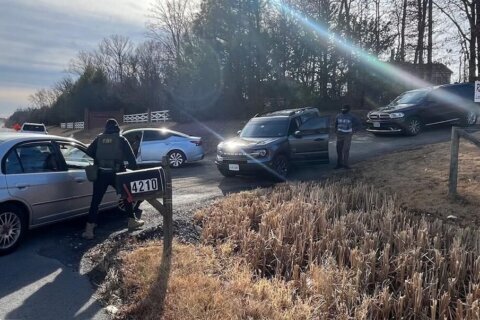This article was republished with permission from WTOP’s news partner InsideNoVa.com. Sign up for InsideNoVa.com’s free email subscription today.
This article was written by WTOP’s news partner InsideNoVa.com and republished with permission. Sign up for InsideNoVa.com’s free email subscription today.
The Prince William County School Board adopted a collective bargaining resolution Wednesday night, formally enshrining the right to collective bargaining on compensation and working conditions for thousands of county school employees in a 7-1 vote.
But victory was hardly declared by union members from the Prince William Education Association, who railed against union election requirements, a lack of binding arbitration and the withholding of job descriptions from the future bargaining table.
“They each took turns telling us their thoughts on passing a resolution that has unfair election process and has no meaningful bargaining,” PWEA President Maggie Hansford said after the vote.
Under the resolution approved Wednesday night, employees would be broken into two bargaining units, one for state-licensed employees like teachers, nurses and counselors, and another unit for non-licensed employees like food workers, bus drivers and maintenance workers.
In order to become the exclusive bargaining representative for one or both of the units, a union would need to submit signatures from 30% of the unit’s employees. After that, a multi-day election would be held at multiple locations among employees within the designated unit. A union would need a majority of votes cast in the election to secure the exclusive bargaining rights for that unit, but if more than half of the entire bargaining unit’s employee pool does not vote in the election, its results will not be certified.
That was one of the provisions that a number of teachers took aim at during the public comment period of Wednesday’s meeting, with some arguing that School Board members didn’t have to meet such a participation threshold in their own elections.
But School Board members said that with over 7,000 employees in the state-licensed unit, it was important to hear from a broad swath about whether workers wanted to be represented by a union. Occoquan District board member Lillie Jessie, who publicly supported collective bargaining throughout the process, said she couldn’t understand why PWEA members were so vocally opposed to hearing from a majority of teachers.
“When you talk about having a seat at the table, I think you need to think about having other teachers have seats at your table … I’m not sure why you’re worried about it,” Jessie said. “I cannot support having a few people make decisions for everyone.”
Some PWEA members had implied that the union would need to receive the votes of half the bargaining unit. Brentsville Board Member Adele Jackson said it was part of a continued effort at misinformation.
The School Board’s vote culminated a years-long effort among school employees and labor leaders from around the state and county for true union representation and collectively-bargained school employee contracts.
In 2020, the Democratic-controlled Virginia General Assembly lifted a prohibition on public sector collective bargaining in the commonwealth that had been in place since the 1970s, though it gave local governing bodies and school boards sole discretion over whether to allow collective bargaining among their employees.
Months after the General Assembly law took effect last year, PWEA members began collecting signatures. By spring of this year, the union submitted cards from more than 30% of the school system’s state-certified non-administrative employees calling for a yes or no vote on bargaining from the School Board.
County teachers have said that bargaining on increased pay and a better work environment will be necessary to keep the school system competitive on recruitment and retention, particularly as growing teacher shortages continue to impact public schools around the region and beyond. Prince William County Schools teachers received a 7% average raise in the fiscal 2023 budget, but their pay remains among the lowest in the Northern Virginia region.
At the same time, many teachers say that the burden of post-pandemic learning loss, increasing standardized testing mandates and professional development time requirements that they have little say over have made the job less attractive.
“The past couple of years have been difficult for everyone …. Our educators that have stayed the course have proved their loyalty, dedication and commitment to not only their profession, but most importantly, the students,” PWEA building representative Amy McCarthy said Wednesday. “Do you trust and value your employees? Really trust and value us enough that we can be a part of the negotiations?”
With Wednesday’s vote, Prince William County Schools employees join public school workers in Arlington and Richmond in obtaining the right to directly negotiate contracts with their school boards. Prince William’s county government is still in negotiations over a bargaining resolution for county employees.
On Wednesday, PWEA members also took aim at provisions detailing what will happen in the event that the school system and union cannot reach a collective bargaining agreement. If agreement for an upcoming fiscal year isn’t reached by Oct. 1, either side can declare an impasse, after which non-binding “mediation” would take place. According to the resolution, if an agreement still can’t be reached after a 30-day mediation period, the School Board would “retain the exclusive authority to determine those matters, including, but not limited to, the continued implementation of the terms of any prior collective bargaining agreement covering those matters.”
Jerod Gay, a George Hampton Middle School teacher and PWEA organizer, said during public comment that the process amounted to nothing more than “meet and confer,” a requirement that comes with no legal recourse.
“Without binding arbitration, this is not collective bargaining. Without binding arbitration, this is meet and confer put in collective bargaining’s clothes,” Gay said. “And I am, honestly, beyond disrespected in the way that I feel with regards to all of this.”
But Eric Paltell, an attorney retained by both the school system and county government to advise on collective bargaining, said that the process would require genuine negotiations between the two sides with legal recourse available if the School Board engages in retaliation, discrimination or bad faith bargaining. Paltell also said that because of case law from the 4th Circuit of the U.S. Court of Appeals and the Dillon Rule, school boards in Virginia likely can’t legally commit themselves to a binding arbitration process because they lack taxing and appropriating authority. In Prince William County and every other locality in Virginia, school boards simply have the authority to determine how the money they’re appropriated – from the local, state and federal governments – will be spent.
Potomac District board member Justin Wilk, one of the biggest supporters of bargaining rights on the School Board, said PWEA leadership and attorneys had submitted 33 proposed changes on the draft bargaining resolution that was unveiled two weeks ago. Of those 33, he said 15 were made.
Among the changes were provisions allowing unions access to use the school system email system to communicate, allowing union elections to be held in-person and by mail and the removal of a provision delaying the start of the union certification process until next January. Having already submitted signatures from over 30% of the system’s certified employees back in the spring, Hansford said that PWEA will next have to give the school board 45-day notice of upcoming elections, though she declined to tell InsideNoVa when PWEA would do so.
“We have collaborated successfully with multiple stakeholders involved in this process. Although certain parties may not have received all the requests in the proposed resolution language, I will remind the community that this is a floor and not a ceiling,” Wilk said ahead of the vote Wednesday night. “No one group was ever going to be completely happy with the full language of this resolution.”
Jessie, meanwhile, said she’d been threatened by some over her vote. After the resolution passed, Hansford asked a group of PWEA members outside the board meeting room, “Who’s running for School Board?”
At the Oct. 4 School Board meeting, division attorney Wade Anderson estimated that overall the process would cost the school system “millions,” something Gainesville board member Jennifer Wall pointed to before casting her dissenting vote. All told, the school system’s budget for the current fiscal year is over $1.5 billion.
Wall said she thought that bargaining would not be in the best interest of the school system’s 91,000 students.
Per Virginia law, public sector employees who engage in an illegal work stoppage or slowdown must be terminated and remain ineligible for re-employment for a full year. The same will continue to apply for Prince William school employees.







